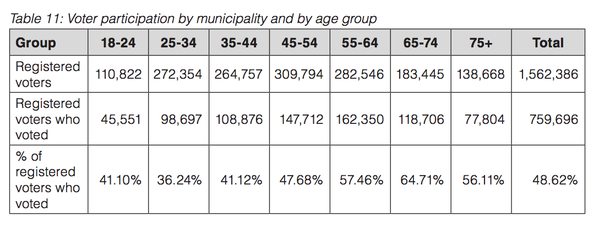A new report from Elections B.C. says this year’s Metro Vancouver transit plebiscite cost more than $5 million.

The reports gave a breakdown of the $5,372,380 spent on the plebiscite:
– Postal services/postage/courier: $2,683,949
– Advertising and publications: $883,599
– Salaries: $801,925
– General office expenses: $509,647
– Information systems: $304,733
– Building occupancy: $136,831
– Professional services: $35,389
– Travel: $16,307
According to the report, a total of 1,572,861 voting packages were issued with 798,262 ballot packages returned. The ‘No’ side won with 61.68 per cent of the vote.
Older voters were more likely to have taken part in the plebiscite. The largest block of voters were between the age of 55 to 64, with 64 per cent of registered voters in that age group taking part.

Younger voters were the least active with just 41 per cent of 18- to 24-year-olds submitting a ballot.
The report said Elections B.C. received several complaints about the plebiscite:

Get daily National news
“Some voters also questioned the month long delay between the close of voting and the announcement of the results. This delay is due to the nature of a vote by mail event. In a provincial election, preliminary results are known within hours of the close of voting because a majority of voters vote in person on General Voting Day and their ballots are counted in the voting places by tens of thousands of election officials. A relatively small number of ballots are cast by mail and counted at final count after being screened for eligibility (confirming that the individual who voted was a registered voter and voted only once). In a vote by mail event, results take longer to determine because counting cannot begin until all ballot packages have been received and screened for eligibility. This screening process is time consuming and conducted by fewer officials.
“Elections BC also received a number of complaints regarding the inclusion of content provided by the Mayors’ Council and Ministry of Transportation and Infrastructure in the information pamphlet, and on the ballot.”
Nearly 40,000 ballots were rejected by Elections B.C. for a variety of reasons. More than 14,000 ballots were not considered because the birthday provided did not match the voter record. More than 2,000 were rejected because they didn’t provide a birthdate at all.
The full report can be read here.









Comments